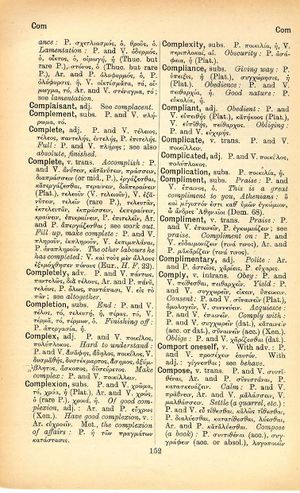compose
καλῶς γέ μου τὸν υἱὸν ὦ Στιλβωνίδη εὑρὼν ἀπιόντ' ἀπὸ γυμνασίου λελουμένον οὐκ ἔκυσας, οὐ προσεῖπας, οὐ προσηγάγου, οὐκ ὠρχιπέδισας, ὢν ἐμοὶ πατρικὸς φίλος → Ah! Is this well done, Stilbonides? You met my son coming from the bath after the gymnasium and you neither spoke to him, nor kissed him, nor took him with you, nor ever once felt his balls. Would anyone call you an old friend of mine?
English > Greek (Woodhouse)
v. trans.
P. and V. συντιθέναι, Ar. and P. συνιστάναι, P. κατασκευάζειν.
Calm: P. and V. πραΰνειν, Ar. and V. μαλάσσειν, V. μαλθάσσειν.
Settle (a quarrel, etc.): P. and V. εὖ τίθεσθαι, καλῶς τίθεσθαι, P. διαλύεσθαι, κατατίθεσθαι, λύεσθαι, Ar. and P. καταλύεσθαι.
Compose (a book): P. συντιθέναι (acc.), συγγράφειν (acc. or absol.), λογοποιεῖν (absol.).
Compose poetry: Ar. and P. ποιεῖν (acc. or absol.).
Compose songs: Ar. μελοποιεῖν (absol.).
Compose (for burial): P. and V. περιστέλλειν, προτίθεσθαι V. συγκαθαρμόζειν.
Be composed (for burial): P. and V. προκεῖσθαι.
Compose oneself: P. and V. ἡσυχάζειν, Ar. and V. μαλάσσεσθαι, V. μαλθάσσεσθαι, ἡσύχως ἔχειν.
Be composed of: P. συνίστασθαι ἐκ (gen.), συγκεῖσθαι ἐκ (gen.).
Words specially composed to meet the occasion: P. λόγοι πρὸς τὸ παρὸν μεμηχανημένοι (Dem. 847).
Men with composed features: P. οἱ πεπλασμένοι (Dem. 1122).
Composing his features to hide his knowledge of the calamity: P. ἀδήλως τῇ ὄψει πλασάμενος πρὸς τὴν συμφοράν (Thuc. 6, 58).

